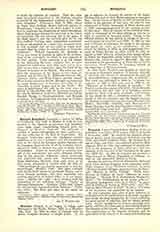

Boucher, PIERRE, b, at Lagny, a village near Mortagne in the Perche, France, 1622; d. at Boucherville, 1717. In 1634 he went to Canada with his father, Gaspard Boucher, a simple joiner. At the age of eighteen he entered the service of the Jesuit. Fathers and went to their Huron missions at Georgian Bay. On his return to Quebec in 1641 he served as a soldier in the garrison of that city. In 1645 he was interpreter of Indian languages at Three Rivers and in 1648 commissary-general of the trading station at that place. Elected captain of the militia in 1651, while in command of the place during an interim in 1653 he repelled an Iroquois attack. Owing to his efficient defense he was placed in charge of the city, and retained the position until 1658. In 1661 he was sent to France to represent the needs of the colonies and plead the cause of the inhabitants. On his return to Canada, in 1662, he was reappointed Governor of Three Rivers, an office which he only resigned in 1667 when he withdrew from public affairs to found the seigniorial parish called after his name Boucherville, situated opposite Montreal. He was succeeded in the governorship of Three Rivers by his son-in-law, Rene Gauthier de Varennes, forbear of the discoverer of Western Canada.
In 1664 Pierre Boucher had printed at Paris by the press of Florentin Lambert “L’histoire veritable et naturelle des moeurs et productions du pays de la Nouvelle-France, vulgairement dite le Canada“. This work was published in 1849 in “L’Album Canadien”, in 1882 at Montreal, and in 1896 in the “Memoires de la Societe Royale du Canada“. An English translation appeared in 1883. Pierre Boucher is considered the best type of a Canadian landed proprietor, filled with piety, rectitude, and honor. At his death he left a numerous posterity. The family is still in existence, and the highest stations are filled by members bearing the names Boucherville, Bruere, Niverville, Grosbois, and Montizambert. Pierre Boucher was the first Canadian colonist to be ennobled by King Louis XIV. His letters of nobility, dated 1661, were renewed in 1707.
J. EDMOND ROY

